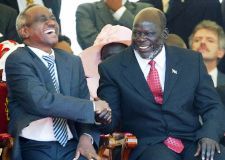Sudan takes firm step to peace
Dec 16, 2005 (KHARTOUM) — The year 2005 should be considered a year of peace in Sudan as it has taken firm steps to realize peace in the south, though talks to end the conflict in the western region of Darfur made slow progress.
 The Sudanese government and the former southern rebel Sudan People’s Liberation Movement (SPLM) signed the Comprehensive Peace Agreement in the Kenyan capital of Nairobi in January to end 21-year civil war between the north and the south, the longest in Africa.
The Sudanese government and the former southern rebel Sudan People’s Liberation Movement (SPLM) signed the Comprehensive Peace Agreement in the Kenyan capital of Nairobi in January to end 21-year civil war between the north and the south, the longest in Africa.
Sudanese President Omar al-Bashir pledged at the signing ceremony his government’s commitment to implement the power and wealth sharing peace deal which stressed the urgent need to restore peace and stability to the war-torn country.
The veteran SPLM leader John Garang was sworn in as first-vice president of Sudan’s national unity government on July 9 after president al-Bashir signed the constitution governing the six-yeartransition.
Garang said at the swearing-in ceremony that he arrived in Khartoum together with his family members to show “a real end” to war in southern Sudan while al-Bashir vowed that Garang “will findfull and lasting cooperation from us”.
Twenty-one days later, Garang died in a helicopter crash on hisway back from a visit to Uganda.
The accident sparked a widespread riots in the Sudanese capitalwhich led to loss of lives and properties.
Salva Kiir Mayardit, Garang’s deputy in the SPLM, took over Garang’s position as first-vice president and president of the southern autonomous government.
Kiir has proven his ability to lead the SPLM toward enhancing the peace process that Garang kicked off.
Sudan’s success in forming a power-sharing national unity government in September with ministers drawn from the ruling National Congress party and the SPLM and other opposition parties marked another progress in implementing the peace deal.
Al-Bashir recently stressed that protecting the country’s unitywould be the greatest challenge as the southerners were allowed tovote on secession in a referendum at the end of the interim period.
“One of our tasks will be to grow culture of peace among the Sudanese people and the youth in particular,” said al-Bashir.
He noted that peace in Sudan would be incomplete unless a political solution to the conflict between his government and rebel groups in Darfur is found.
Peace talks in the Nigerian capital of Abuja under the auspicesof the African Union have been fruitless since the Declaration of Principles was signed in July to seek a peaceful end to Darfur conflict.
The row over power and wealth sharing had almost stalled the latest round of talks which resumed on November 28.
War broke out in February 2003 when the rebels — the Sudan Liberation Movement (SLM) and the Justice and Equality Movement (JEM) — began fighting what they say is the political and economicmarginalization of the region’s black African tribes by Khartoum.
Up to 300,000 people have reportedly died and more than two million fled their homes in what UN aid agencies have dubbed world’s worst humanitarian crisis.
“Our commitment to the peace negotiations remain constant and we will be open to any contributions which aim to facilitate and push the political solution,” said al-Bashir.
“But we will not allow anyone to exploit the problem to impose regency over the country.”
(Xinhua)
